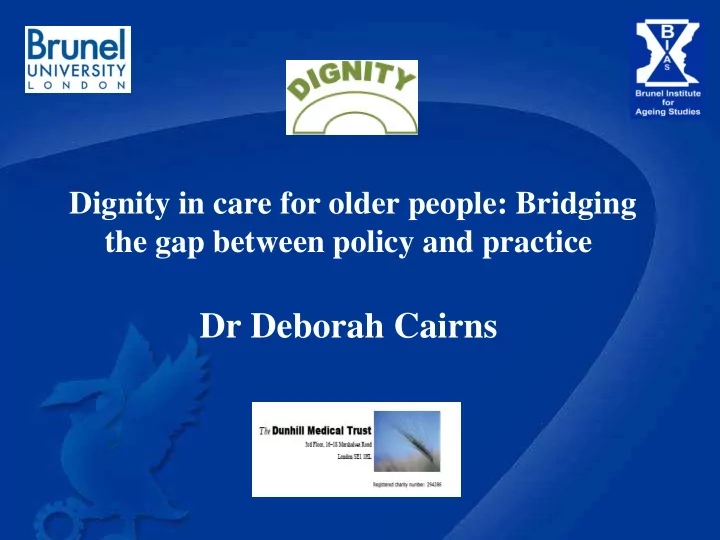

Dignity in care for older people: Bridging the gap between policy and practice Dr Deborah Cairns
Project team Brunel University Professor David Oliver Professor Christina Victor (City University London) Dr Sally Richards Dr Deborah Cairns (Oxford Brookes University ) Professor Andreé le May (Formerly University of Dr Veronika Williams Southampton) Dr Wendy Martin
Definition “dignity is concerned with how people feel, think and behave in relation to the worth or value of themselves and others. To treat someone with dignity is to treat them as being of worth, in a way that is respectful of them as valued individuals.” (RCN, 2008) Dignity in the care of older people Whilst the past decade has seen a growing emphasis placed upon ensuring dignity in the care of older people it appears that this policy objective is not being consistently achieved and there is a gap between policy and practice.
What is the aim of this study? This study aims to investigate how dignified care for older people is understood and delivered by the health and social care workforce and how organisational structures and policies can promote and facilitate, or hinder, the delivery of dignified care.
Project Background 30 month Dunhill Medical Trust funded project
Recruitment sites The participants in this study were drawn from four Trusts with good dignity ratings: • Royal Berkshire Hospital Foundation NHS Trust • The Hillingdon Hospital NHS Trust • Berkshire Healthcare Foundation NHS Trust • Central and North West London NHS Trust
Pilot Study • 11 health and social care professionals were asked to provide feedback on survey questionnaire, interview and focus group schedule. Main comments: • Positive feedback • Seven participants stressed that an online questionnaire would receive a better response rate than hard copies.
Data Collection This study is an in-depth case study involving a mixed method design employing: Design Target Recruitment to date Questionnaire Survey 300 103 In-depth interviews 50 19 Focus Groups 13 7 Analysis of organisational documents - and policies
Questionnaire Survey Preliminary Findings
Survey Recruitment to date Trusts Hard copies Hard Hard Online Total copies copy survey administered n returned response n n rate n The Hillingdon 160 43 27% 0 43 Hospital Royal Berkshire 200 28 16% 3 31 Hospital 123 20 19% 0 20 Berkshire Healthcare Central and North - - - 7 7 West London - - 2 2 Other 483 91 19% 12 103 Total
Profile of respondents Job Role 40 36 Number of participants 35 32 30 25 20 14 15 10 7 6 5 3 3 2 0 0 Job Role
Profile of respondents Age Gender 45 40 40 Number of participants 35 15% 30 M 25 25 22 20 15 11 85% 10 F 5 5 0 under 25 25-34 35-44 45-54 55 and over Age
Survey Questions 1. How much work time is spent with older people? 2. What does dignified care mean to you? 3. What do you consider to be the most important aspects of dignified care? 4. What helps you to maintain and improve your ability to provide dignified care? 5. What prevents you from providing dignified care?
1. How much work time is spent with older people?
2. What does dignified care mean to you? theme Quote n Respect 39 “Dignified care means treating patients with respect” To be treated as an “Individualised care based on the specific needs of each 34 individual person” “Patient focused, where possible involving them to take part Involved in decision in decision making regarding their 30 making treatment/care/placement” “to ensure that they are covered at all times and curtains Privacy are always drawn with a red peg on if a patient is having 30 care” “Ensuring that they are able to attend to, or are given Care and Support 18 support with activities of daily living” Treat as you wished to “To be treated in a manner that you would expect to be 15 be treated treated” 9 “Dignified care to me is ensuring that the patient is in a safe Safe environment environment” “Having the ability to empathize and understand the Empathy 2 individuals predicament “
3. What do you consider to be the most important aspects of dignified care? (Rank: 1 = most important, 8 = least important) Aspects of dignified care Mean Ranking Treating a patient as an individual 2.20 1 Maintaining privacy when providing care at all times 2.81 2 and in all places Having time to talk and actively listen to patients 4.07 3 Responding promptly and professionally when 4.14 4 patients ask for help Providing adequate help with personal care (e.g. 5.05 5 washing, clothing, toileting) Addressing patients as they (or their carers) have 5.17 6 asked to be addressed Helping patients at meal times 5.30 7 Obtaining consent from patients for sharing 7.26 8 information
4. Which of these would help you to maintain and improve your ability to provide dignified care? (select 3 most important only) Rating Better staffing 1 Less work pressure 2 More time 3 Education 4 Support from your managers/organisation 4 Better work environment (e.g. equipment, cleanliness, space) 5 Integration of dignity into work philosophy 6 Peer support 7
5. What prevents you from providing dignified care? “staffing levels - sometimes not “too much pressure to enough to provide the quality of document clinical observations care you want to” (staff nurse) frequently. Too much paperwork keep us away from patients bedsides for too long!” (staff nurse) “Lack of time and resources” (physiotherapist) “demands on time, unwell patients, lack of staff” (health care assistant)
Summary High percentage of time spent with older people The meaning of dignified care appears consistent across participants ‘Privacy’ and ‘Being treated as an individual’ were the most important aspects of dignified care while the physical tasks attributed much less importance. Lack of time, too much work pressure and staffing levels were considered barriers to providing dignified care
Thank you
Recommend
More recommend